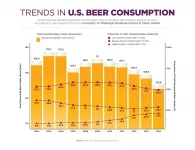(Press-News.org) The largest study of its kind has unveiled new insights into how genes are regulated in dementia, including discovering 84 new genes linked to the disease.
Led by the University of Exeter, the international collaboration combined and analysed data from more than 1,400 people across six different studies, in a meta-analysis published in Nature Communications. These studies had used brain samples from people who had died with Alzheimer's disease. The project, funded by Alzheimer's Society and supported by the Medical Research Council and the National Institutes for Health, looked at an epigenetic mark called DNA methylation at nearly half a million sites in the genome. Epigenetic processes control the extent to which genes are switched on and off, meaning they behave differently as needed across the different cell-types and tissues that make up a human body. Importantly, unlike our genes, epigenetic processes can be influenced by environmental factors, making them potentially reversible and a possible route to new treatments.
The study looked at epigenetic patterns across the genome, in a number of different regions of the brain. The team then related the amount of DNA methylation to the amount of neurofibrillary tangles within the brain, which is an important hallmark of the severity of Alzheimer's disease.
The team looked in different regions of the brain, which are affected in Alzheimer's disease before looking for common changes across these cortical regions. They identified 220 sites in the genome, including 84 new genes, which showed different levels of DNA methylation in the cortex in individuals with more severe Alzheimer's disease, which weren't seen in another area of the brain called the cerebellum.
The team went on to show that a subset of 110 of these sites could distinguish in two independent datasets whether a brain sample had high or low levels of disease, with more than 70 per cent accuracy. This suggests that epigenetic changes in the brain in Alzheimer's disease are very consistent. The findings were subsequently confirmed in an independent set of brain samples from the Brains for Dementia Research cohort funded by the Alzheimer's Society and Alzheimer's Research UK.
Professor Katie Lunnon, of the University of Exeter, who led the research, said: "Our study is the largest of its kind, giving important insights into genomic areas that could one day provide the key to new treatments. The next step for this work is to explore whether these epigenetic changes lead to measurable changes in the levels of genes and proteins being expressed. This will then allow us to explore whether we could repurpose existing drugs that are known to alter the expression levels of these genes and proteins, to effectively treat dementia"
The study included a number of international collaborators from the US (Columbia University and Mount Sinai School of Medicine in New York, Rush University Center in Chicago, Arizona State University), and Europe (Maastricht University in Netherlands, University of Saardland, Germany). The paper is titled 'A meta-analysis of epigenome-wide association studies in Alzheimer's disease highlights novel differentially methylated loci across cortex', published in Nature Communications.
Dr Richard Oakley, Head of Research, Alzheimer's Society said: "Epigenetics is a flourishing area of dementia research. Work like this, led by the University of Exeter, is another step forward in our understanding of the incredibly complex role our genes play in Alzheimer's disease.
"It's now important to delve into the specific impact of these epigenetic changes and the associated genes on the changes in the brains of people with Alzheimer's disease. This work is in early stages but breakthroughs in research begins with work like this, and it brings us a step closer to developing new treatments for Alzheimer's disease.
"Alzheimer's Society is delighted to have part-funded this work and 'Brains for Dementia Research', which provided the tissue samples to this research team. Without the support of charities, this work simply would not be possible - we are committed to investing in, and accelerating, dementia research. However, dementia research remains hugely underfunded. We need public support now more than ever to help us continue our ground-breaking research to make a world without dementia a reality."
Largescale brain epigenetics study provides new insights into dementia
The largest study of its kind has unveiled new insights into how genes are regulated in dementia, including discovering 84 new genes linked to the disease.
2021-06-10
ELSE PRESS RELEASES FROM THIS DATE:
Beyond Remission: From Alcohol Dependence to Optimal Mental Health
2021-06-10
UNIVERSITY OF TORONTO & CARLETON UNIVERSITY
New research published online in the journal Substance Use & Misuse is good news for those struggling with alcohol dependence: the possibility of ending this dependency gets easier with age. Moreover, more than half of individuals who have been dependent on alcohol are free of any addictions or mental illness, and nearly 40% are in excellent mental health.
Using data drawn from Statistics Canada's Canadian Community Health Survey-Mental Health, researchers examined a nationally representative sample of 820 adult Canadians with a history of alcohol dependence to 19,945 who had never been addicted to alcohol.
They found that in the past year, 71% of ...
Alcohol companies earned billions from underage drinking in 2016
2021-06-10
PISCATAWAY, NJ - Underage youth consumed $17.5 billion worth, or 8.6 percent, of the alcoholic drinks sold in 2016. Products from three alcohol companies--AB Inbev, MillerCoors and Diageo--accounted for nearly half of youth consumption, according to a new study published in the Journal of Studies on Alcohol and Drugs.
Data collected in a landmark study of youth alcohol consumption by brand enabled the authors to calculate the first estimate in nearly 20 years of the monetary value of youth alcohol consumption. And for the first time, they were able to attribute those revenues to specific companies.
"The alcohol industry has said they don't want minors to drink, ...
Monoclonal antibody therapy for COVID-19 safe, effective for transplant patients
2021-06-10
ROCHESTER, Minn. -- Treating transplant patients with mild to moderate cases of COVID-19 with monoclonal antibodies is safe and helps prevent serious illness, according to a Mayo Clinic study recently published in Open Forum Infectious Diseases. These results are especially important because transplant patients who are infected with COVID-19 have a higher risk of severe illness and death.
"Monoclonal antibody therapy is really important for the transplant population because they are less likely to develop their own immunity. Providing them with these antibodies helps them recover from COVID-19," says Raymund Razonable, M.D., a Mayo Clinic infectious diseases specialist and the study's senior ...
New dipping solution turns the whole fish into valuable food
2021-06-10
When herring are filleted, more than half their weight becomes a low-value 'side stream' that never reaches our plates - despite being rich in protein and healthy omega-3 fatty acids. Now, scientists from Chalmers University of Technology, Sweden, have developed a special dipping solution, with ingredients including rosemary extract and citric acid, which can significantly extend the side streams' shelf life, and increase the opportunities to use them as food.
Techniques for upgrading these side-streams to food products such as minces, protein isolates, hydrolysates and oils are already available today, and offer the chance to reduce the current practices of using them for animal feed, ...
Molecular changes in white blood cells can help diagnose 'the bends' earlier in divers
2021-06-10
For over a century, researchers have known about "the bends", a serious condition affecting scuba divers. However, we still know relatively little about its physiological basis. Doctors do not yet have a definitive test for the bends, instead relying on symptoms to diagnose it. A new study in Frontiers in Physiology is the first to investigate genetic changes in divers with this condition, finding that genes involved in inflammation and white blood cell activity are upregulated. The findings cast light on the processes underlying the bends, and may lead to biomarkers that will help doctors to diagnose the condition more precisely.
The bends, more formally known as decompression sickness, is a potentially lethal condition that can affect divers. Symptoms ...
Patient-provider discussions about bariatric surgery play pivotal role in weight loss outcomes
2021-06-10
BOSTON -- Obesity increases one's risk for many diseases and often prevents patients from receiving other necessary medical procedures. One of the most effective ways for patients with severe obesity to lose weight is through bariatric surgery, but it's not clear how often this option is raised. In a new study published in Obesity, investigators from Brigham and Women's Hospital find that eligible patients who discuss bariatric surgery options with their primary care providers or specialists from disciplines ranging from cardiology to urology are more likely to undergo surgery and lose more weight than ...
Flickering screens may help children with reading and writing difficulties
2021-06-10
Previous studies have shown that children with attention difficulties and/or ADHD solve cognitive tasks better when they are exposed to auditory white noise. However, this is the first time that such a link has been demonstrated between visual white noise and cognitive abilities such as memory, reading and non-word decoding in children with reading and writing difficulties.
"The white noise to which we exposed the children, also called visual pixel noise, can be compared with giving children glasses. The effect on reading and memory was immediate," explains Göran Söderlund, Senior Lecturer in Education at the University of Gothenburg and Professor of Special Education at the Western Norway University ...
New research shows link between politics, boredom and breaking public-health rules
2021-06-10
People who are more prone to boredom and who are socially conservative are more likely to break public-health rules, according to new psychology research.
While previous research demonstrated a connection between being highly prone to boredom and breaking social-distancing rules, this study demonstrated the association was more prominent as participants' social conservatism increased.
"Many public-health measures such as wearing a mask or getting a vaccine have become highly politicized," said James Danckert, professor of psychology at the University of Waterloo. "People who find these ...
Higher alcohol content beer popularity growing, as overall beer consumption down
2021-06-10
PITTSBURGH, June 10, 2021 - Americans are consuming more craft beer with higher alcohol content but are drinking less beer by volume, according to a new analysis led by epidemiologists at the University of Pittsburgh Graduate School of Public Health.
The study, published online and in a coming issue of the journal Substance Use & Misuse, looked at beer purchased in stores between 2004 and 2014. This is the first study to examine trends not only in the volume of beer purchased, but also the "beer specific" alcohol content.
"With the rise in popularity of craft breweries and the acquisition of such breweries by large-scale ...
India's national government has inappropriately prioritised people for covid-19 vaccination
2021-06-10
India's national government has inappropriately prioritised people for covid-19 vaccination
Current approach is causing huge numbers of avertable deaths, warn experts
India's national government has inappropriately prioritised people for covid-19 vaccination, argue doctors and researchers in The BMJ today.
Peter Lloyd-Sherlock and colleagues warn that the government's current approach to vaccination - focusing on younger age groups - "is causing huge numbers of avertable deaths and is deeply inequitable."
From 3 May to 5 June 2021, more first doses were administered to people under 45 than over 60, even though at ...
LAST 30 PRESS RELEASES:
GLP-1 drugs associated with reduced need for emergency care for migraine
New knowledge on heritability paves the way for better treatment of people with chronic inflammatory bowel disease
Under the Lens: Microbiologists Nicola Holden and Gil Domingue weigh in on the raw milk debate
Science reveals why you can’t resist a snack – even when you’re full
Kidney cancer study finds belzutifan plus pembrolizumab post-surgery helps patients at high risk for relapse stay cancer-free longer
Alkali cation effects in electrochemical carbon dioxide reduction
Test platforms for charging wireless cars now fit on a bench
$3 million NIH grant funds national study of Medicare Advantage’s benefit expansion into social supports
Amplified Sciences achieves CAP accreditation for cutting-edge diagnostic lab
Fred Hutch announces 12 recipients of the annual Harold M. Weintraub Graduate Student Award
Native forest litter helps rebuild soil life in post-mining landscapes
Mountain soils in arid regions may emit more greenhouse gas as climate shifts, new study finds
Pairing biochar with other soil amendments could unlock stronger gains in soil health
Why do we get a skip in our step when we’re happy? Thank dopamine
UC Irvine scientists uncover cellular mechanism behind muscle repair
Platform to map living brain noninvasively takes next big step
Stress-testing the Cascadia Subduction Zone reveals variability that could impact how earthquakes spread
We may be underestimating the true carbon cost of northern wildfires
Blood test predicts which bladder cancer patients may safely skip surgery
Kennesaw State's Vijay Anand honored as National Academy of Inventors Senior Member
Recovery from whaling reveals the role of age in Humpback reproduction
Can the canny tick help prevent disease like MS and cancer?
Newcomer children show lower rates of emergency department use for non‑urgent conditions, study finds
Cognitive and neuropsychiatric function in former American football players
From trash to climate tech: rubber gloves find new life as carbon capturers materials
A step towards needed treatments for hantaviruses in new molecular map
Boys are more motivated, while girls are more compassionate?
Study identifies opposing roles for IL6 and IL6R in long-term mortality
AI accurately spots medical disorder from privacy-conscious hand images
Transient Pauli blocking for broadband ultrafast optical switching
[Press-News.org] Largescale brain epigenetics study provides new insights into dementiaThe largest study of its kind has unveiled new insights into how genes are regulated in dementia, including discovering 84 new genes linked to the disease.


